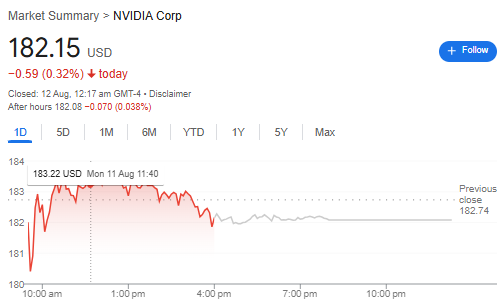China Nvidia and AMD Tensions Threaten AI, Crypto, and Tech Markets
In a dramatic turn of events, China has urged its companies not to use Nvidia’s H20 chip just hours after the U.S. chipmaker signed a revenue-sharing deal with the Trump administration.
According to Bloomberg, this latest China Nvidia move could reignite tensions between Washington and Beijing, once again putting technology at the center of a trade dispute.
 Source: The Kobeissi Letter
Source: The Kobeissi Letter
Only a day before, Nvidia and rival AMD agreed to the U.S. government 15% of revenues from specific chip sales in the country.
In return, they would receive export licenses for restricted products, including Nvidia’s H20 and AMD’s MI308 chips.
Revenue-Sharing Instead of Tariffs?
The agreement is unprecedented. Rather than paying tariffs, the companies will hand over a portion of their revenue not profit to the U.S. government.
This arrangement emerged after President Donald Trump threatened a 100% tariff on imported chips unless companies built them in the U.S.
By opting for revenue-sharing, NVDA and AMD aimed to bypass the tariff threat while still serving the Chinese market.
The H20 chip was originally designed for chinese market as a lower-spec AI processor to skirt U.S. export rules, but earlier this year, its sales were blocked entirely.
China’s Response Signals Trouble
The China Nvidia standoff has escalated quickly. Beijing’s latest instruction to domestic firms to avoid the H20 could be seen as retaliation.
If Chinese companies follow the order, Chip sales in the country could take a major hit making the revenue-sharing deal far less profitable than expected.
This also raises another big question: could such revenue-sharing deals replace traditional tariffs in trade negotiations for the future?
Although the Trump administration appears open to company-by-company arrangements, the pushback by chinese government depicts that the planning might encounter serious resistance abroad.
Also Trump recently announced a 90 days delay for the Tariffs deadline on the country.
Market Reaction Turns Cautious
Firstly, the news of the deal boosted investor sentiment. NVDA shares closed at $182.74 on August 8, up 1%, while AMD also saw small gains. But the optimism was short-lived.
In the past 24 hours, NVDA's stock has slipped 0.68% and AMD’s has dropped 0.28% .
 Source: Google Finance
Source: Google Finance
Analysts say the reduction depicts uncertainty over how the China Nvidia conflict will go further.
If China’s restrictions bite hard, both companies could lose significant revenue.
On the other hand, if China Nvidia negotiations soften the stance, the export licenses could open up fresh opportunities in one of the world’s largest chip markets.
Could This Spill Over Into Other Sectors?
Some analysts consider the standoff could bleed over into other sectors. The chip conflict is already impacting AI development, blockchain usage, and also the crypto markets.
NVDA's technology drives much of AI-powered crypto mining infrastructure, and disruption to its operations in the chinese market could potentially impact the global blockchain ecosystem indirectly.
With Bitcoin recently crossing the mark of $122,000 and the crypto market cap reaching near $4 trillion, the stakes are high.
A long-running China Nvidia fight would stall technology sharing and innovation between both superpowers, impacting stock markets as well as the digital economy.
Is This the Beginning of a New Trade War?
It's more than a company battle; it's a warning that the technology competition is reaching a new level.
Whether revenue-sharing becomes a permanent alternative to tariffs or simply an experiment that fails in a few weeks will be determined by the progression of the China Nvidia matter in the weeks ahead.
Conclusion
For the time being, markets are observing with great interest. What Washington and Beijing decide next may determine if it is a temporary setback or the beginning of a whole new full-scale trade war.
Also read: Income Tax Bill: India Reveals ₹29,208 Cr Hidden Wealth and Crypto免责声明:本文章仅代表作者个人观点,不代表本平台的立场和观点。本文章仅供信息分享,不构成对任何人的任何投资建议。用户与作者之间的任何争议,与本平台无关。如网页中刊载的文章或图片涉及侵权,请提供相关的权利证明和身份证明发送邮件到support@aicoin.com,本平台相关工作人员将会进行核查。




